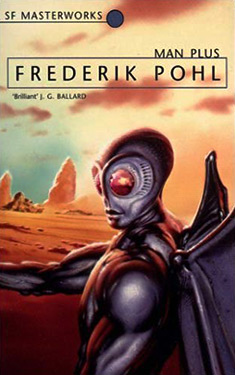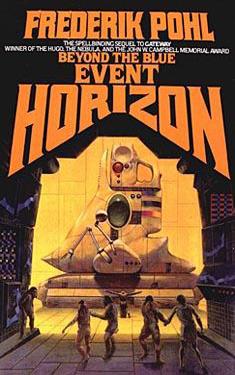Frederik Pohl’s Gateway on Your TV?
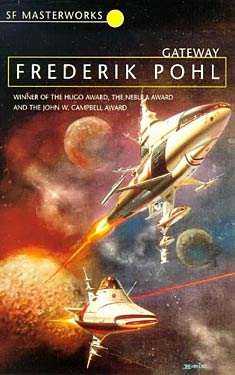 The late great Frederik Pohl‘s most famous novel may be coming to the small screen soon. The film rights to Gateway have been purchased at auction by Entertainment One Television in collaboration with De Laurentiis Co. who plan to develop and produce a TV drama series adapted from the book. Details seem to be a bit sketchy at this point but you can read a bit more about it on Pohl’s site: The Way the Future Blogs. Hopefully we’ll get more info soon to whet our appetites.
The late great Frederik Pohl‘s most famous novel may be coming to the small screen soon. The film rights to Gateway have been purchased at auction by Entertainment One Television in collaboration with De Laurentiis Co. who plan to develop and produce a TV drama series adapted from the book. Details seem to be a bit sketchy at this point but you can read a bit more about it on Pohl’s site: The Way the Future Blogs. Hopefully we’ll get more info soon to whet our appetites.
I think Gateway lends itself pretty easily to an episodic television show. It’s pure adventure and there’s plenty of room to build stories around desperate crews risking their lives on the HeeChee ships. You could even frame the show around Robinette Broadhead recounting his adventures to his holographic shrink!
I think it will be interesting to see what they can do with a Hugo, Nebula, Locus SF and Campbell award winning novel that’s also a SF Masterwork and shows on seven other best of lists! Of course, there’s a huge downside to attempting to make a show based on a fan favorite like Gateway but, like Bob, the show runners think it’s worth a roll of the dice.
GMRC Review: The Best of Frederik Pohl Edited by Lester Del Rey
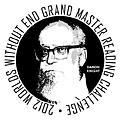 Chris Uhl (chuhl) can’t remember a time when he wasn’t a science fiction fan. He has a B.A. in Classics from Vassar College and an M.A. in English Literature from the University of Virginia. He has worked as a teacher, a legal assistant, a college development officer, a salesman, and a film extra. Chris may be the only WWEnd reviewer who has no blog. This is his fifth GMRC review to feature in the WWEnd blog and completes his challenge!
Chris Uhl (chuhl) can’t remember a time when he wasn’t a science fiction fan. He has a B.A. in Classics from Vassar College and an M.A. in English Literature from the University of Virginia. He has worked as a teacher, a legal assistant, a college development officer, a salesman, and a film extra. Chris may be the only WWEnd reviewer who has no blog. This is his fifth GMRC review to feature in the WWEnd blog and completes his challenge!
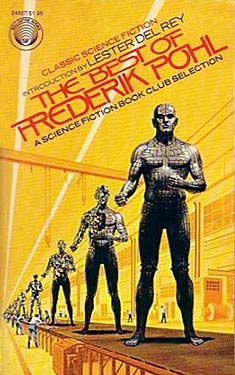 The Best of Frederik Pohl, edited by Lester Del Rey, collects nineteen stories written during the first half century of Pohl’s life.
The Best of Frederik Pohl, edited by Lester Del Rey, collects nineteen stories written during the first half century of Pohl’s life.
Tunnel Under the World – Why does Guy Burckhardt keep living June 15th over and over again? Pohl mixes one of his favorite themes, the use and abuse of advertising, with Cold War paranoia and keeps ratcheting up the tension until the triple-twisting climax. One of the best stories in the collection.
Punch – A quick little story about an alien who comes to earth and freely offers technological, medical, and financial secrets that propel humanity into a new golden age. But what’s in it for him? Like many of the stories in this collection, the real point of the story is the shocking twist at the end. It works well here, but sometimes you get the impression that the story exists just to set up the twist, and the tale is wagging the dog.
Three Portraits and a Prayer – Pohl has a real gift for characterization, and he’s not afraid to tell this and several other stories through the viewpoint of a rather unpleasant person, in this case, an arrogant doctor. The characterization of the narrator is the main attraction here, not the plot. But I do like this line: “If gravity itself grows old and thin, so that the straggling galaxies themselves weaken as they clutch each other, it seems somehow a much lesser thing that we too should grow feeble.”
GMRC Review: Man Plus by Frederik Pohl
 Guest Blogger, Allie McCarn, reviews science fiction and fantasy books on her blog Tethyan Books. She has contributed many great book reviews to WWEnd and has generously volunteered to write some periodic reviews for our blog.
Guest Blogger, Allie McCarn, reviews science fiction and fantasy books on her blog Tethyan Books. She has contributed many great book reviews to WWEnd and has generously volunteered to write some periodic reviews for our blog.
Editor’s note: This review was submitted in July but there was a mix-up and we missed posting it in the blog for the GMRC.
Man Plus by Frederik Pohl
Published : Random House, 1976
Awards Won : 1976 Nebula Award
Awards Nominated: Hugo, John W. Campbell, and Locus SF Awards
The Book:
“In the not-too-distant future, a desperate war for natural resources threatens to bring civilization to a crashing halt. Nuclear warships from around the globe begin positioning themselves as the American government works feverishly to complete a massive project to colonize Mars.
Former astronaut Roger Torraway has agreed to be transformed by the latest advances in biological and cybernetic science into something new, a being that can survive the rigors of Mars before it is terraformed. Becoming Man Plus will allow him to be the linchpin in opening the new Martian frontier…but not without challenging his humanity as no man has ever been challenged before.” ~barnesandnoble.com
Man Plus is my July book for WWEnd’s Grand MasterReading Challenge. Frederik Pohl is not a completely new author to me, as I have read and loved his novel Gateway. Man Plus has some interesting ideas, but it did not replace Gateway as my favorite Pohl novel to date.
GMRC Review: All the Lives He Led by Frederik Pohl
 New WWEnd member, Ellie Bogomazova (alchymyst), is a bookseller, geek, gamer and reader of all things sci-fi and fantasy. She works at Politics and Prose bookstore in Washington, DC, and reviews books on her brand new blog Spacetalkers From Outer Shelf. Speaking of new, Ellie has just started on the GMRC and this is her first review.
New WWEnd member, Ellie Bogomazova (alchymyst), is a bookseller, geek, gamer and reader of all things sci-fi and fantasy. She works at Politics and Prose bookstore in Washington, DC, and reviews books on her brand new blog Spacetalkers From Outer Shelf. Speaking of new, Ellie has just started on the GMRC and this is her first review.
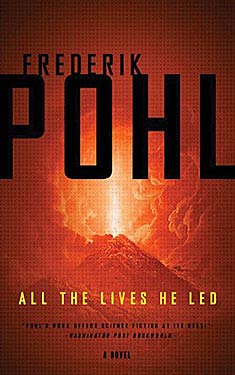 I think it’s a little strange to start reading Frederik Pohl with his latest book, All the Lives He Led. After all, the man has been writing award-winning sci-fi since way before I was born. And after reading this book, I realize this is also not perhaps the best introduction to Pohl’s work, because unless you know about Frederik Pohl’s track record and are determined to read more of him, this book alone would not inspire you to do so.
I think it’s a little strange to start reading Frederik Pohl with his latest book, All the Lives He Led. After all, the man has been writing award-winning sci-fi since way before I was born. And after reading this book, I realize this is also not perhaps the best introduction to Pohl’s work, because unless you know about Frederik Pohl’s track record and are determined to read more of him, this book alone would not inspire you to do so.
The main character is Brad Sheridan – born into a well-to-do family, his fortunes change with the eruption of a super-volcano in Yellowstone that covers half of United States with ash. Brad’s family loses their fortune and moves to a refugee camp on Staten Island. Brad grows up committing petty crimes and getting mixed up in shady deals. He then signs up as an Indentured person and moves first to Egypt, then to Pompeii, to work at what is now a tourist theme park, complete with Roman currency, people selling Roman wine and food, and the city rebuilt via virtual reality.
At its core, the story is a thriller set in a dystopia – terrorism is common world-wide, with attacks happening virtually every day; people start dying of a mysterious disease nicknamed Pompeii Flu; Brad’s girlfriend, a mysterious and beautiful woman named Gerda, disappears without a trace; his coworker is found dead. And yet despite all these things happening, the story just seemed rather boring. Perhaps it is because Pohl’s writing seems ill-suited to the thriller genre and does not convey a sense of suspense and mystery. Perhaps it is the characters. Brad is extremely difficult to sympathize with. He is not likeable or smart – he is a pretty crude (for lack of a better word) guy, especially in the way he talks about women. He is also, despite having grown up in a rough environment, somewhat lacking in street smarts – he talks about things he probably shouldn’t talk about, fails to observe the fairly obvious. 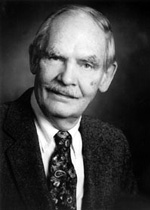 His pining for Gerda does not elicit any sympathy either and actually starts grating on reader’s nerves after a while. The problem also is that Brad is one of those main characters who has things happening to him rather than making things happen. This, unfortunately, makes for a very shallow story – there is a multitude of events and characters, but the only way we know what is happening is to read about Brad’s reactions to all these events.
His pining for Gerda does not elicit any sympathy either and actually starts grating on reader’s nerves after a while. The problem also is that Brad is one of those main characters who has things happening to him rather than making things happen. This, unfortunately, makes for a very shallow story – there is a multitude of events and characters, but the only way we know what is happening is to read about Brad’s reactions to all these events.
This is obviously a work of a writer with many novels under his belt, because even despite the unsympathetic character and at times slow action, you keep reading, because the narrative is just so smooth. It is a good read, but it does not read like Pohl’s best work.
This one gets 2 denarii out of 5 from me. Never fear, I will read Pohl’s other stuff (a copy of Gateway is on my nightstand).
GMRC Review: Beyond the Blue Event Horizon by Frederik Pohl
 Guest Blogger and WWEnd member, valashain, reviews science fiction and fantasy books on his blog Val’s Random Comments which we featured in a previous post: Five SF/F Book Blogs Worth Reading. Val has posted many great reviews to WWEnd and this is his seventh for the GMRC. Be sure to visit his site and let him know you found him here.
Guest Blogger and WWEnd member, valashain, reviews science fiction and fantasy books on his blog Val’s Random Comments which we featured in a previous post: Five SF/F Book Blogs Worth Reading. Val has posted many great reviews to WWEnd and this is his seventh for the GMRC. Be sure to visit his site and let him know you found him here.
Beyond the Blue Event Horizon is the second book in Frederik Pohl‘s Heechee Saga, a series that started out with the 1972 novella The Merchants of Venus. This novella was reprinted in Platinum Pohl among other collections. The first Heechee novel, Gateway (1976), is one of his best regarded solo novels and won him a whole shelf full of awards. I guess it is not surprising that after that kind of success, a sequel has a hard time living up to expectations. I’ve heard a lot of people say this is one of those series you should only read the first book of. Pohl went on to write three more books and a bunch of short fiction, none of which I have read, but personally I didn’t think Beyond the Blue Event Horizon a bad book. It is very different from Gateway though, that has to be said.
After successfully facing his successes and failures at Gateway, Robinette Broadhead is now living the life of a very rich man. He has married and has diverse interests in various profitable businesses as well as close ties with the Gateway corporation and even quite a bit of political influence. In other words, he has it made. Still, there is the nagging feeling of guilt that the woman who is the love of his life is stuck in a singularity. In business problems arise as well when an expedition to a distant Heechee installation, which Robinette hopes will help combat the chronic food shortages on Earth, meets with unexpected problems. It takes 25 days for instructions to reach the explorers, and as the situation in the outer solar system gets more and more out of control, Robinette’s problems increase. Desperate action is needed.
One of the most striking differences between Gateway and Beyond the Blue Event Horizon is that Pohl employs a lot of different points of view in the second volume. In fact. Robinette doesn’t even show up until the fourth chapter, some 50 pages into the novel. A lot of the major players in the novel get a point of view, as well as some of the machine entities, but there are quite a few of them, so we only get to scratch the surface of most of these characters. Where Pohl was very concerned with the psychology of Robinette in the first novel, the plot is obviously more important in the second. That is not to say that Robinette’s internal struggle is not an important part of the story, he is still this petty, selfish but basically decent person we met in Gateway, but Pohl leans quite heavily on events in the previous novel to convey this to the reader.
The Heechee on the other hand, although still very absent, are much more important to the story. The artifact being explored is clearly one of theirs but has been circling the sun since before humanity’s ancestors learnt to use tools. It has a history of its own and that history includes other intelligences as well. Pohl reveals that history through these many points of view, gradually revealing a new part of the mystery with each chapter. It is this revealing that may put off some readers. In Gateway, the Heechee are a mystery. With only their incomprehensible artifacts and structures around, very little was actually known for sure about them. It made the story unpredictable in a way. With a Heechee artifact around, you never know what might happen. The increased understanding in Beyond the Blue Event Horizon changes that. Personally I don’t think you can reasonably expect the mystery to stay intact for several books, there has to be at least some progress to keep the story moving, but some readers will no doubt prefer their own questions, answers and guesses over those of Pohl.
Pohl’s answers to the riddle the Heechee and their seemingly impossible technology pose, involve a lot of guesswork and quite a bit of cosmology and physics. I must admit some of it was right over my head. Still trying to wrap my head around Mach’s principle for instance, an idea that was apparently one of the inspirations to Einstein’s general theory of relativity. It also contains a number of references to Stephen Hawking’s work on black holes. Where electronic shrink Siegfried is Robinette’s discussion partner of choice in the first book, in this one his science program, aptly named Albert, takes over. It must be said, Albert is very good at explaining his guesses, which, especially towards the end of the novel, become more and more important to the plot. One would expect a program modelled on one of the greatest physicists of all time to do a little less guessing, but Robinette often orders him to do so anyway. Some of these guesses are obviously a set up for the next novel. It appears fairly obvious what Robinette’s next project will be. This novel, after all, does not solve the issue that is the basis of his ever present guilt.
 Pohl’s works often have a satirical undertone. Many of his works criticize the excesses of capitalism for instance, or are fairly cynical about the political influence and proper healthcare money can buy. Robinette is not adverse to using his wealth to get things done his way for instance. It is not quite as apparent in this book however. The most notable thing about this novel is that it is drenched in fear. The fear of meeting the unexpected in space, where there is no retreat and very little margin for error. More than a few science fiction novels feature fear, suspicion and paranoia. Especially the so called big dumb object stories, of which Gateway could be considered a variation, usually contain it in a general measure. I guess it is not as claustrophobic as Gateway, but the knowledge that aliens are near weighs on the characters. Due to the number of point of view characters, it is not as oppressive as in the previous novel, but it is almost always present in the background as each of these characters experiences their own personal flavour of fear.
Pohl’s works often have a satirical undertone. Many of his works criticize the excesses of capitalism for instance, or are fairly cynical about the political influence and proper healthcare money can buy. Robinette is not adverse to using his wealth to get things done his way for instance. It is not quite as apparent in this book however. The most notable thing about this novel is that it is drenched in fear. The fear of meeting the unexpected in space, where there is no retreat and very little margin for error. More than a few science fiction novels feature fear, suspicion and paranoia. Especially the so called big dumb object stories, of which Gateway could be considered a variation, usually contain it in a general measure. I guess it is not as claustrophobic as Gateway, but the knowledge that aliens are near weighs on the characters. Due to the number of point of view characters, it is not as oppressive as in the previous novel, but it is almost always present in the background as each of these characters experiences their own personal flavour of fear.
There is one element in this novel that I absolutely didn’t like, and that is the way Robinette’s wife is portrayed. She is practically perfect in every way, knowing what is wrong with him before he knows himself and allowing him to go after the love of his life, who according to physics should be out of reach forever. Events in Gateway are more than enough reason to feel guilty but Robinette’s treatment of his wife certainly adds to the problem. Siegfried’s work doesn’t appear to be done. The story is a bit open ended on this point. It looks like Pohl will get back to it in the third volume.
I guess you could say Pohl took a bit more conventional approach in writing Beyond the Blue Event Horizon. It makes the book less groundbreaking than Gateway was and probably is part of the reason why it didn’t win any of the awards it was nominated for. The scope of it is obviously much wider too, and the many switches in point of view makes it appear a bit less structured than its predecessor. If you view the story as the unveiling of (part of) a mystery, it makes more than enough sense to me. In the end I guess I agree with many of the critics that it is not quite as good a novel as Gateway was. I also think it would have been nice if it had been a little more self contained; if it were fantasy I’d say this book suffered from the middle book syndrome a bit. That being said, it is a good science fiction novel in the classic sense. Plenty of hard science, scientific speculation and a much larger scope than the first book in the series offer their own attractions. I guess it depends on what you want out of a novel but I thought it was an enjoyable read.
GMRC Review: Gateway by Frederik Pohl
 Jeremy Frantz (jfrantz) reviews SF/F books on his blog The Hugo Endurance Project where he has given himself just 64 weeks to read every Hugo Award winner. This is his fifth GMRC review.
Jeremy Frantz (jfrantz) reviews SF/F books on his blog The Hugo Endurance Project where he has given himself just 64 weeks to read every Hugo Award winner. This is his fifth GMRC review.
Humans have been living in tunnels on Venus for a number of years, but when suddenly ancient alien spacecraft are uncovered, the universe, just as suddenly, gets a heck of a lot smaller. Robinette Broadhead makes his way out to the Gateway asteroid/base in hopes of striking it rich as a prospector and leaving his problems behind. Once he arrives though, he realizes it’s not quite as simple or as safe as he’d hoped. Alternating between Robinette’s prospecting journeys from Gateway and therapy sessions with a computer some years after later, we slowly unravel the details that have plunged him into a stiflingly dark depression since leaving.
How much do I care about this guy?
I almost always love super advanced computers/self-aware machines. If I have not made this clear in the past, let me do so now. I don’t even care if it is a really anachronistic view of computers – if you make that personality real enough or you give that computer the power to do cool enough stunts, I will be drooling all over the pages. I’m not sure when this obsession started, but I am thoroughly stuck in it and I don’t care to get out.
So when Gateway begins with a computer named “Sigfrid” putting Robinette through a Freudian psychoanalysis session–and it’s a pretty sassy program–I knew I was going to have fun with this one.
My immediate fascination with Sigfrid may have actually worked against my interest in Robinette. He is kind of a jerk and just not that interesting to me, or at least he wasn’t as I read through this time. He isn’t completely colorless, he’s just a really immature guy and maybe a little bit of an anti-hero who had trouble currying any of my favor (come to think of it though, Pohl probably intended that very much). I think there was probably some potential for him, but the way he kept making it so hard to get to know more about Sigfrid made me more than a little frustrated.
The therapy sessions did go a long way to humanizing Robinette in the end though. And that was my take-away here; even once the entirety of space is opened up to us, we are still going to need to deal with our problems, parents are still going to suck (I should know) and people are still going to just have sex and use drugs rather than face up to their issues. Scalzi said it: “I’m still going to need to take out the trash.”
For those who have read this, the ending, which I hope I will not give away for those who haven’t, gave me a little of a Hitchcock’s Psycho feeling – you know the feeling of being made to believe we should care about one person and then abruptly realize it was someone else? I don’t normally like the shocker type ending, but given my previously mentioned propensities, this one worked out in my favor.
Classifieds
Throughout the book are little vignettes, classifieds excerpts or other miscellany from life on Gateway. Some of the excerpts worked better than others. I’m not sure if it was just my printing but they seemed to be placed nearly at random and practically every other instance interrupted a thought/sentence and, even if it was interesting, the effect was to pull me right out of the story almost every time. Of the different types of excerpts, I most enjoyed the classifieds and the mission reports. Most others were not quite mildly interesting and there were quite a few aimed at simply reiterating how little we know about the Heechee and seemed redundant.
 I didn’t always understand why this method was chosen either. Sure it functions as kind of a unique worldbuilding technique but interrupting the rest of the text didn’t make sense and to be honest some of the mission reports just seemed like copouts in place of having to work include some semi-relevant info into the story when it otherwise would not fit. The classroom exchanges could have easily been shortened and worked into their own chapter and would have been much easier to read and probably more interesting to boot. But then, Pohl won not only the fan choice (Hugo) but also the writers’ choice (Nebula) awards, and according to the back cover copy Pohl called this the best thing he’d ever written, which probably illustrates the fact that I’m just making this up as I go along and my literary judgment is worth slightly less than squat.
I didn’t always understand why this method was chosen either. Sure it functions as kind of a unique worldbuilding technique but interrupting the rest of the text didn’t make sense and to be honest some of the mission reports just seemed like copouts in place of having to work include some semi-relevant info into the story when it otherwise would not fit. The classroom exchanges could have easily been shortened and worked into their own chapter and would have been much easier to read and probably more interesting to boot. But then, Pohl won not only the fan choice (Hugo) but also the writers’ choice (Nebula) awards, and according to the back cover copy Pohl called this the best thing he’d ever written, which probably illustrates the fact that I’m just making this up as I go along and my literary judgment is worth slightly less than squat.
Recommendation
I had a little trouble identifying with Rob as I read Gateway, but now that I’ve written this review, I’m starting to see him as an ingenious character as devised by Pohl. He’s just so blah that it makes the ending all that much more shocking. This was an easy, fast-paced read (not for the action, it just read that way) and while it incorporated a lot of my favorite SF elements, I wouldn’t expect this to be one of my favorites. It did make me want to seek out more of Pohl’s work. I couldn’t say how accurate they were but if you enjoy the tension and drama of a juicy therapy session, you’ve got to read this!
GMRC Review: The Man Who Ate the World by Frederik Pohl
 Long time WWEnd member and Uber User, Emil Jung, is an obsessive SF/F reader and as such he’s become a huge supporter of WWEnd. (We often refer to him as our "South African Bureau.") Besides hanging out here, Emil writes poetry on his blog emiljung.posterous.com. This is the third of Emil’s GMRC reviews to feature in our blog.
Long time WWEnd member and Uber User, Emil Jung, is an obsessive SF/F reader and as such he’s become a huge supporter of WWEnd. (We often refer to him as our "South African Bureau.") Besides hanging out here, Emil writes poetry on his blog emiljung.posterous.com. This is the third of Emil’s GMRC reviews to feature in our blog.
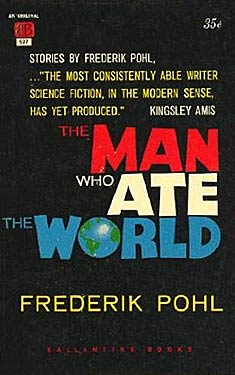 Although Frederik Pohl‘s work began in the Campbellian era, he has always helped to determine the future of the genre through measured work as an editor, anthologist and writer. He began his career as a magazine editor in 1940 and wrote extensively with Jack Williamson and C. M. Kornbluth.
Although Frederik Pohl‘s work began in the Campbellian era, he has always helped to determine the future of the genre through measured work as an editor, anthologist and writer. He began his career as a magazine editor in 1940 and wrote extensively with Jack Williamson and C. M. Kornbluth.
With Kornbluth he produced the classic The Space Merchants (1953), which describes a future world dominated by advertising, a theme preceded here by a few years in the stories "The Wizards and the Waging" and "The Waging of the Peace", taking a "slickly ironic" look (to quote John Clute from The Encyclopedia of Science Fiction) at how humans react to everyday commercial products pushed into their faces. It’s incredibly fun to read about how the National Electro-Mech fortified factory inundates a small town Buick salesman with new Buicks and how the very same salesman ends up as a recruit in attacking and stopping the production of these cars. These final two stories, arguably the best in the collection, are slightly anti-capitalist satire. Nothing strange here, considering Pohl’s short foray in the Young Communist League during the late 1930s. Shortly hereafter – as a side note – he enlisted in the army, and, in weird twist of fate, served with Jack Williamson as a weather observer.
The title story "The Man Who Ate the World" is the weakest in the collection and is the only one I remember reading as a youngster. It’s a tragic story about this child growing up and trained to consume and consume, without his parents nurturing him. This important part of early childhood development is left to robots. Eventually, as an adult, he continues to consume and build robots to produce robots that destroy robots, ever repeating the cycle of consumption, ultimately threatening the existing world order. A psychologist comes to the rescue, reuniting the adult child with his teddy. Yeh, yeh, a cop-out and archaic Freudian psychology, but I did say this is the weakest story in the collection. It does not detract from Pohl’s more than subtle jab at American consumerism, that expectation for people to consume, buy, and destroy in order to repeat the cycle. Despite my gripe about the teddy, the story is still fun… and its insinuation certainly still rings true for modern day consumerism.
"The Snowmen" is my personal favorite, at 8 pages the shortest in the collection, and most bizarre, even cadaverous, hinting at a certain Roald Dahl chromaticity. Pohl skillfully unfolds the whole allegory in which in courting couple invites an alien visitor into the woman’s home. Her reputation, it seems, is well-known throughout the existing universe. While she entertains the alien, the man plunders and loots the alien craft, with a wonderfully macabre twist at the end.
 "The Day the Icicle Works Closed" is about economic manipulation and collapse. A distant planet is cut off from trade and most people resort to renting their bodies to tourists while their minds perform hard labor elsewhere, usually inside gigantic machines, underground, in mines. The scientific mechanism on just how this happen is not explained, but that isn’t the point, is it? Pohl sets up a society that is forced to survive through disagreeable means because of economic disparity. So we see some ex-factory workers attempting to kidnap the mayor’s sons for ransom instead of whoring out their bodies to reckless and inconsiderate tourists. Ever considered your own behavior when driving a rental?
"The Day the Icicle Works Closed" is about economic manipulation and collapse. A distant planet is cut off from trade and most people resort to renting their bodies to tourists while their minds perform hard labor elsewhere, usually inside gigantic machines, underground, in mines. The scientific mechanism on just how this happen is not explained, but that isn’t the point, is it? Pohl sets up a society that is forced to survive through disagreeable means because of economic disparity. So we see some ex-factory workers attempting to kidnap the mayor’s sons for ransom instead of whoring out their bodies to reckless and inconsiderate tourists. Ever considered your own behavior when driving a rental?
In Pohl’s novels Jem: The Making of a Utopia (1979) and Man Plus (1976) we meet characters who adapt to their strange environments by losing, or changing their humanity. Although "The Seven Deadly Virtues" do not address the exact same issues we do recognize similar themes. The story is set on Venus and I can’t imagine a harsher environment to live in. It’s an interesting society featuring a conditioning response to killing – you simply cannot do it. That aside, once you have acclimatised fully to conditions on Venus, there is no leaving. And once society has shunned you, you become a non-person. This happens to a relative new arrival to Venus, who steals the wife of a very powerful man, resulting in his ostracization. Someone else, also shunned, is included in the plot to topple the powerful man. The solution is masterfully done and very plausible.
All in all, this is a stunning collection of six short stories by a master storyteller, and despite them being dated by 50+ years, still quite unique and remarkably prescient, generally poking fun at mass production, consumerism and industrialization. These stories of social criticism were a blast and expose Frederik Pohl as the hidden hero of SF. Think of him in terms of the Golden Age. He knew them all – who else is still alive?



















 Full Details
Full Details
